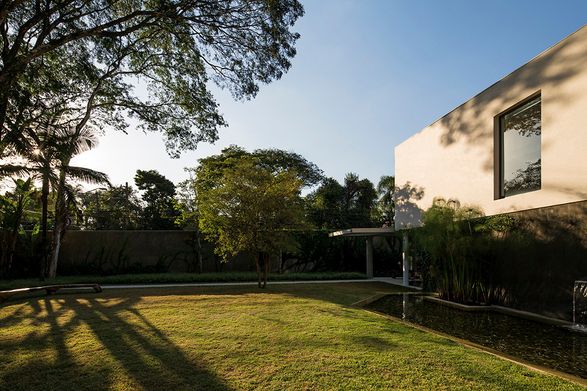
Research Institute
ARCHITECTS
Reinach Mendonça Arquitetos Associados
PRODUCTION
Ilana Stern
INTERIORS
Reinach Mendonça Arquitetos Associados
LANDSCAPE
Barbieri + Gorski Arquitetos Associados
LIGHTING
Foco Luz E Desenho
D’ÁGUA
Sander Inox
HVAC
Logitec Projetos
CIVIL
Soc Empreiteira De Mão De Obra; Impermeabilizações Marquises: Netherland Engenharia Ltda.; Tratamento Em Concreto Aparente: Mundial Service; Caixa D’água: Sander Inox
FOUNDATIONS CONSULTANT
Pali Projeto E Assessoria De Fundações Ltda.
IT
Codenet
PERSIANAS
Uniflex Moema; Luminárias: Lumini / Lemca / Itaim; Cubas De Aço Inox: Mekal Aço E Design;
Louças E Metais Sanitários: Deca; Empreiteira De Mão De Obra
CONSTRUCTION
Sigla Construtora
SITE SURVEY
Sologeo Sondagens
SECURITY
Escolta Serviços / Ga Advising
STRUCTURE AND FOUNDATIONS
Companhia De Projetos Ltda.
SUPPLIERS
Mobiliário: Giroflex / Arquivo Vivo / Dpot / Escinter / Fernando Jaeger / Moichi Ono;
Esquadrias De Alumínio: Esmecol Esquadrias Em Alumínio;
PROJECT ARCHITECTS
Henrique Reinach E Maurício Mendonça
COORDINATOR
Camila Osele
COLLABORATORS
Victor Gonçalves, Tony Chen, Mariana Picolo, Fernanda Almeida, Luena Vettorazzo, Tais Vieira, Yuri Chamon, Paula Leal, Pedro Tavares, Caio Tritto, Olivia Uliano, Alessandra Musto, Ayla Barros, Paulo Scheuer, Barbara Rubira
ELECTRICAL AND PLUMBING
Pessoa E Zamaro
PHOTOGRAPHS
Leonardo Finotti
YEAR
2013
LOCATION
São Paulo, Brazil
CATEGORY
Research Center
Text description provided by architect.
This project is characterized by the delicacy of the intervention. The existing house was commissioned to Oscar Niemeyer's office, but designed and signed by Carlos Lemos in the early fifties and even today conserved with few changes.
The renovation and expansion to adapt it to an office and study center tried to preserve as much as possible from the original architecture, both internally and externally.
The main entrance was moved to the area of least movement in order to better organize the pedestrian and car access, focused on valuing the large garden area.
Two very light marquees of exposed concrete expand contact with the outside areas creating spaces for events around the auditorium.
The existing lounge area incorporates the balcony space with columns to create a broad and full auditorium through the descending floor.
The slabs of the new marquees make clear the intervention through the use of exposed concrete and structural lightness with an ingenious single line of columns, balanced by steel rods.
A red concrete wall reinforces the separation of the parking courtyard and values the new landscape garden and access courtyard, revitalized with a reflecting pool.
Upstairs, the old bedroom area was transformed into an integrated workspace supported by small meeting rooms.
Decisions on building materials followed some information from the existing house, the clarity of the proposed new volumes and also accessibility, comfort and acoustic quality required especially in workspaces and the auditorium.
The new marquees and red walls in exposed concrete mark the strongest interference on the old structure.
External floors are made of fulget (granite) and the interior floors are made of wood in the halls and passageways, auditorium and meeting rooms.
The carpet was used exclusively in the area for workstations. Plaster lined acoustic plates in the auditorium generate comfort during meetings and lectures.
The green garden over the two new marquees was the solution adopted for motion control, thermal control, and the view from the upper floor.



























